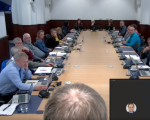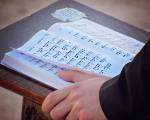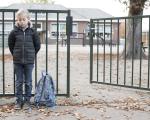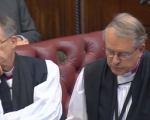Transport to faith schools
Discrimination on grounds of religion and belief is prominent in the provision of both discretionary and statutory home to school transport. We seek equitable school transport policies, free from religious privilege, fair to all families and fair to taxpayers.
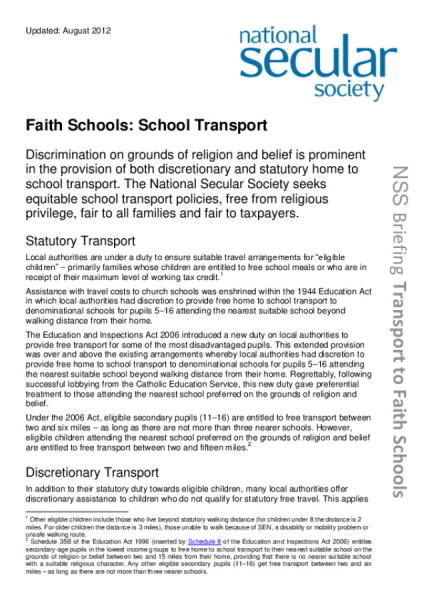 Faith Schools Transport Briefing Paper (PDF, 222 Kb)
Faith Schools Transport Briefing Paper (PDF, 222 Kb)
Related news
Scotland: “No plans” to end religious committee representatives
Posted: Wed, 21 Sep 2022 13:05
Scotland's Education Secretary has said there are "no plans" to end places for religious appointees on education committees.
Shirley-Anne Somerville MSP said the requirement for local authorities in Scotland to appoint religious representatives would continue, in response to a letter sent by the National Secular Society and the Edinburgh Secular Society in August calling for an end to the process.
In her reply earlier this month, she said the presence of "significant numbers of denominational schools" in Scotland and the "requirement to provide Religious Education" means there "continues to be a role for religious groups in decision making for denominational and non-denominational schools alike".
The Local Government (Scotland) Act 1973 obliges local authorities in Scotland to appoint three religious representatives to their education committees, at least one of whom must be appointed by the Roman Catholic Church and one by the Protestant Church of Scotland.
Such representatives have voting privileges in most councils, enabling them to influence local education policies affecting both faith and non-faith schools. They are generally the only unelected members granted such entitlements.
The letter from the NSS was sent following a meeting of Shetland Islands Council where several members expressed dissatisfaction at being required to appoint a religious representative to the authority's education committee, with councillors describing the situation as both "unconstitutional and undemocratic" and "ridiculous in the 21st century".
Similar concerns regarding the legislation have been raised by councillors at other Scottish local authorities, with Perth and Kinross council voting in 2019 to remove religious representatives' voting privilege after the Scottish Government clarified such entitlements were not legal requirements. Following the statement, the NSS wrote to all 32 Scottish councils asking them to follow suit.
NSS: Religious representatives create "a hierarchy of inequity"
Jack Rivington, Campaigns Officer at the NSS, said: "The Scottish Government's response is deeply unsatisfactory.
"Automatically appointing religious representatives to education committees runs totally contrary to the fundamental principles of our democratic system, as well as enabling undue religious influence over the education of Scottish children.
"Additionally, preferential treatment given to two religions in particular creates a hierarchy of inequity and undermines inclusivity.
"Religious people have a right to express their views on education policy, but those views must proceed through the standard democratic process instead of being given special privileges and automatic access. This is also the position increasingly taken by Scottish local authorities.
"Instead of ignoring the issue, the Scottish Government should listen to these concerns and review this outdated piece of legislation. Denominational schools and religious education should not be used as justification to continue this anachronistic requirement – instead, Scotland should work towards ensuring its whole education system is inclusive, secular and free from religious control."
NSS urges education secretary to end religious appointees law
Posted: Mon, 22 Aug 2022 12:40
The National Secular Society has called on Scotland's education secretary to end automatic places on education committees for religious appointees following concerns from councillors.
In a letter to Scotland's Cabinet Secretary for Education and Skills, Shirley-Anne Somerville, the NSS called for legislative reform to remove religious appointees because "religious views do not require privileged status and should compete for representation, as all other ideas do, via the democratic process."
The Local Government (Scotland) Act 1973 requires local authorities in Scotland to appoint three religious representatives to their education committees. At least one of them must be appointed by the Catholic Church and one by the Protestant Church of Scotland.
As religious representatives have voting rights in most councils, they are able to influence local education policy.
The letter from National Secular Society chief executive Stephen Evans, and co-signed by Edinburgh Secular Society, comes in the wake of criticism from Shetland Isles councillors required to appoint a religious representative earlier this month.
Gary Robinson, of Lerwick North, said the requirement was "quite frankly ridiculous in the 21st century", adding the appointment was made "not because we want to, because we are being required to".
This sentiment was echoed by fellow councillors.
The full Shetland Islands Council (pictured) subsequently passed a motion to initiate a dialogue with the Scottish government on the matter via the Convention of Scottish Local Authorities.
In April 2019, Perth and Kinross Council voted to end religious representatives' voting rights after the Scottish government said there was no legal obligation to grant these rights. The NSS has since written to all 32 councils in Scotland to ask them to follow suit.
NSS: Appointing religious reps "gives religion undue influence"
Stephen Evans said: "Shetland councillors are absolutely right to highlight the absurdity of laws requiring religious representatives to sit on local authority education committees.
"Religious representatives should of course be able to feed their views in through the normal democratic process, but their views should not be given any special or institutional weight. Doing so runs counter to democratic principles.
"The law requiring the appointment of religious reps to education committees gives religion undue influence over the education of Scottish children and undermines efforts to make Scotland more inclusive and equal. The Scottish government should repeal it as soon as possible.
"Until such time, councillors across Scotland can limit the influence of this undemocratic law by voting to remove religious appointees' voting rights."
A National Secular Society report in 2019 made the case for removing religious appointees from education committees in Scotland.
Secular subjects at faith school limited to English and maths
Posted: Fri, 22 Jul 2022 12:28
A faith school has failed an inspection for devoting most of its curriculum to religion, with "little time" for secular subjects.
Talmud Torah Tiferes Shlomo, an independent Jewish school in London, was rated "inadequate" by Ofsted, who said pupils "spend most of the school day on their Jewish studies".
Ofsted said the quality of education at the school, which is for boys aged three to 15, is "poor" in a report published yesterday.
The inspection, which took place in May, was brought forward at the request of the Department for Education due to "concerns raised about the quality of education and pupils' welfare".
The report said pupils have lessons in English and mathematics but "do not learn any other subjects in depth". Pupils in Years 7 to 10 are not taught physical education, and do not receive high quality careers guidance. Some pupils "have stereotypical views about the jobs that women can do".
Pupils in Year 10 take GCSE exams in mathematics and English, but if they want to study other subjects at GCSE they must do this outside school, Ofsted found.
There are no regular extra-curricular activities and pupils only have "limited opportunities" to explore their interests and talents.
Ofsted said pupils do not have enough opportunities to learn about other cultures and religions, and the programme for personal, social, health and economic education does not include all the protected characteristics in the Equality Act 2010.
Schools are required to promote equality and pupils' understanding of the protected characteristics which are outlined in equality law. But many Jewish schools fail to do so because they have religious objections to teaching about LGBT+ people.
The inspection found relationships and sex education (RSE) at the school is "not in line with statutory guidance", as leaders "have decided not to cover aspects of relationships education in Years 7 to 10". Leaders have not informed parents that they do not have the right to withdraw their children from relationships education in the secondary phase.
Inspectors were requested not to ask pupils about aspects of RSE, "specifically anything related to sexual relationships, sexual orientation and gender identity". Ofsted said there is "no evidence" pupils have an age-appropriate understanding of healthy relationships.
Jewish counter-extremism group Nahamu has demonstrated how the lack of RSE in strictly orthodox Jewish schools means engaged couples may not be ready for sexual relations and may lack knowledge of consent, abuse and rape.
Some Jewish faith schools illegally refuse to register with the Department for Education in order to avoid inspection so they can teach children an unsuitable faith-based education without oversight. A schools bill has been introduced in parliament that would introduce new powers to the government to close loopholes that enable unregistered schools to continue running.
NSS: Case underlines need for proper regulation
National Secular Society head of campaigns Megan Manson said: "This case underlines the need for all schools, including independent faith schools, to be properly regulated.
"Even when they are registered with the Department for Education, some faith schools like this one attempt to break the law by offering an extremely narrow, religion-based curriculum which severely limits pupils' opportunities.
"Ofsted can tackle this by penalising schools that fail education and welfare standards.
"However, we know there are many faith schools kept deliberately and illegally unregistered because leaders do not want pupils to receive a secular education.
"That's why provisions to crack down on unregistered schools in the Schools Bill must become law, without being watered down."
Islamic school also fails
Yesterday Ofsted also published an inspection report on The Fountain School, an Islamic independent school in Bradford.
Ofsted rated the school 'inadequate' after finding that although pupils "gain greater knowledge" in Urdu and Arabic, pupils read "very few whole texts and study very little drama and poetry" in English.
Additionally, pupils are taught "hardly any British and local history".
Some teachers do not have any formal qualifications in the subjects they teach, including at GCSE, Ofsted found.
The report said a "minority" of pupils said they do not feel they can raise safeguarding concerns because they worry about how they will be treated. Ofsted said concerns raised by pupils during the inspection have been referred to "the appropriate agencies".
Women’s health strategy aims to end taboos
Posted: Wed, 20 Jul 2022 16:43
The government aims to end taboos on women's health issues including menstruation and contraception in its new strategy.
The government today published its woman's health strategy following a consultation last year.
The National Secular Society responded to the consultation urging the government to ensure women's health is prioritised over religious concerns. It raised reproductive rights, violence against women, and relationships and sex education as examples where the imposition of religion may have a negative impact.
The strategy document indicates the government has responded to some of these concerns:
- They aim for "high-quality, evidence-based education on women's health from an early age" and for women's health issues such as menstrual health and contraception to no longer be taboo subjects "anywhere in society". The NSS highlighted how some faith schools teach stigmatising ideas around contraception and menstruation in its consultation response.
- They will set out plans for sexual and reproductive health later this year. This will include increasing access and choice for all women who want contraception and ensuring women can continue to access robust and high-quality abortion services. The NSS emphasised the importance of protecting access to safe abortions and emergency contraception.
- They aim for greater awareness among the general population of specialist services for victims of sexual violence, including female genital mutilation (FGM). The NSS urged the government to tackle religiously-motivated misogyny, including FGM.
- Together with the recent NSS-supported ban on 'virginity testing' and 'virginity repair' hymenoplasty, the government is developing an awareness raising programme to "tackle the harmful misbeliefs that surround a woman's virginity". An impact assessment document on the hymenoplasty ban published on Tuesday said hymenoplasty is a form of 'honour'-based violence performed on women and girls "predominantly in highly conservative communities", particularly some Muslim and Jewish communities.
NSS: 'Welcome ambitions to tackle imposition of religious beliefs on women's health'
NSS head of campaigns Megan Manson said: "We welcome the government's ambitions to tackle several of the women's health issues we raised, including improved relationships and sex education, access to contraception and abortion, and strategies to end violence against women.
"These are all areas where the imposition of religious beliefs has proved detrimental to women's rights, health and wellbeing.
"The government must now ensure it lives up to its ambitions without giving way to any demands from religious groups that want to reinforce conservative gender roles."
Pupils at failing Catholic school 'do not learn about other faiths'
Posted: Wed, 13 Jul 2022 13:28
A state-funded Catholic school has been criticised by inspectors for failing to teach pupils about other religions.
According to an Ofsted report published this month, pupils at Our Lady Immaculate Catholic Primary School in Wigan "do not learn about faiths or cultures other than their own".
They are therefore "not well prepared to live in a diverse society".
The school was rated 'inadequate' by Ofsted for this and other failings, including its "poor" curriculum and high numbers of "vulnerable" pupils who do not attend school regularly.
Our Lady Immaculate is a voluntary aided school, which means it can teach religious education (RE) from its own exclusive viewpoint.
Its RE curriculum is delivered through the 'Come and See' scheme of work based on Catholic theology.
NSS: Faith schools "ill-suited" to 21st century education
National Secular Society head of campaigns Megan Manson said: "It is not surprising that faith schools permitted to teach RE from their own exclusive viewpoint fail to prepare children for living in a diverse society.
"This case demonstrates the inherent conflict between ensuring all children are taught about different faiths and cultures, and faith schools' desires to inculcate children with their particular religion.
"This intractable issue shows how ill-suited faith schools are to the educational needs of children in the 21st century."
Failings at independent faith schools
Other Ofsted reports published this month revealed a number of independent faith schools have also failed to meet standards:
- Ofsted conducted an unannounced monitoring visit to the Institute of Islamic Education in Dewsbury prompted by complaints about sexual abuse, safety and quality of care. The inspection found leaders failed to properly address a "serious allegation" of peer-on-peer sexual abuse and an assault on a pupil by other children. Similar concerns were raised last year.
- Wiznitz Cheder School, a Jewish school in London, gives "too little time" to secular subjects. Despite developing a plan to teach about different religions and cultures and different types of families, it has not ensured that these plans are applied effectively in the classroom.
- Pupils at Talmud Torah Yetev Lev, another Jewish school in London, continue to have a "limited understanding" of other faiths and cultures despite repeated concerns raised. The school has also failed to meet safeguarding standards.
Gov't refuses to end faith school discrimination despite inequalities
Posted: Wed, 29 Jun 2022 10:05
The National Secular Society has called on the government to act to end faith-based school admissions after a minister admitted they cause inequality.
Last Friday Secretary of State for Education Robin Walker said a "smaller proportion of disadvantaged and minority ethnic pupils" attend church schools compared to other schools, according to 2018 research by the Department for Education (DfE).
He said this was due to a "range of factors" including "admissions oversubscription criteria" and parental preference.
He was responding to a parliamentary question from Liberal Democrat MP Wera Hobhouse, who asked earlier this month whether he had made an assessment of the "potential impact of religious selection on socioeconomic inclusion in schools."
She also asked if he will "make it his policy to reduce the number of school places offered on a faith basis".
Walker said the DfE "understands that the ability to prioritise children of faith when oversubscribed is important to faith schools and we do not intend to change that."
He said the DfE "expects all schools, including faith schools, to be open and inclusive".
He added: "All schools, including faith schools, must ensure that their admission arrangements are fair and objective, and that the arrangements will not disadvantage unfairly a child from a particular social or racial group."
But most state-funded faith schools are permitted to discriminate against pupils on the basis of their religion or belief due to exemptions in equality law. Exceptions in the Equality Act 2010, secured following heavy lobbying from religious groups, allow faith schools to prioritise children from families who are active members of the religion of the school above other children.
Walker used his response to praise faith schools, saying the DfE "values the contribution that they make to a diverse school system".
The government policy on faith schools in England differs considerably from its position in Northern Ireland. Last week NI Secretary Brandon Lewis announced the government would set up a programme to support integrated schools, where children from all religion and belief backgrounds are educated together. The programme will "promote the benefits of integrated education" to parents, teachers and pupils.
NSS comment
NSS head of campaigns Megan Manson said Walker's comments revealed support for religious selection at faith schools is "increasingly difficult to justify".
She said: "The government's own research demonstrates discriminatory faith school admissions contribute to socioeconomic and ethnic segregation in our school system.
"And yet they refuse to act to end religious selection in the schools all our taxes pay for, whatever our religion or belief, out of fear of upsetting the faith groups that control these schools.
"The government may say it expects faith schools to be 'open and inclusive'. But it is impossible for a school based on a specific religious to be truly inclusive of children from all backgrounds – and especially a school that deprioritises children from the 'wrong' faith or belief background in its admissions criteria."
"The government's policy for schools in England is also completely at odds with its more progressive approach in Northern Ireland, where it is increasingly pushing for schools to be truly inclusive of all – and rightly so.
"But how can it convincingly argue to people in Northern Ireland that integrated schools are the best way to educate children while it continues to support divisive faith schools in the rest of the UK?"
Islamic school leader banned for misogynistic and homophobic sermons
Posted: Mon, 20 Jun 2022 16:11
The National Secular Society has welcomed a decision to ban a former faith school proprietor after he published hateful sermons about women and gay people.
The Department for Education today announced Waheed Alam, also known as Abu Khadeejah, has been prohibited from managing schools for engaging in conduct that is "aimed at undermining the fundamental value of individual liberty".
Alam is the former proprietor of Redstone Educational Academy, an independent Islamic school in Birmingham.
The DfE said Alam produced a number of online sermons and articles between 2015 and 2019 which "fail to show tolerance of, and respect for, the rights of others".
This includes material expressing views that seek to "restrict the activities of women" and "denigrate and demonise gay men".
Alam's views came to light during an Ofsted inspection in 2019, as part of Redstone Educational Academy's move to register separate boys' and girls' schools.
Redstone Educational Academy had been segregating boys and girls within the same school despite a 2017 judgement finding such segregation to be unlawful discrimination.
The inspection found the proposed girls' school was "unlikely to meet" all independent school standards because the proprietor "publicly extols views that should not be promoted by the owner of an independent school in England".
Ofsted said Alam's views are "well known, published widely and pupils are more able to access them as the proprietor is known to them".
Ofsted cited material published by Alam that equated homosexuality with paedophilia.
He also said Muslim scholars "state that homosexuality comes about due to a corruption of the natural state which can be triggered by various events", including "school indoctrination of children from an early age that goes against nature, health and wellbeing".
In a 2019 sermon he said women should not leave the home without permission from their husband or father, and that the ways of Western women are worse "even than the beasts".
Redstone Educational Academy also failed its inspection in 2020 after Ofsted found boys at the school were "treated favourably", "have more privileges" than girls and "enjoy school more than girls".
In the 2019 inspection, Ofsted said the school "has a history of failing to meet standards since 2014".
NSS comment
NSS head of campaigns Megan Manson said: "It is shocking that the proprietor of a school in the UK could openly publish these hate-filled sermons that contradict the fundamental values schools are meant to teach: equality, liberty and tolerance.
"It's not hard to see why this school has a substantial history of failure – particularly in regard to discrimination against female pupils.
"Ofsted must continue to take action to protect the rights and welfare of the children at the school. If the school cannot prioritise pupils' educational needs above archaic and fundamentalist religious dogma, it must be closed down."
Image: From Waheed Alam (a.k.a. Abu Khadeejah)'s website.
Government opposes moves to protect secular schools’ ethos
Posted: Wed, 15 Jun 2022 16:56
The government has refused to support amendments to a bill which would help nonreligious academies protect their secular ethos.
Amendments to the Schools Bill, which was debated in the House of Lords on Monday, aimed to replace compulsory collective worship at nonreligious academies in England with inclusive assemblies, and religious education with pluralistic religion and worldviews education.
It would also require greater scrutiny of the potential impact to the school's ethos if a nonreligious academy applied to join a religious multi academy trust (MAT).
But Baroness Joanna Penn, responding on behalf of the government, said the government "do not agree" with the amendments, which were subsequently dropped.
The moves were also opposed by the bishop of Chichester Martin Warner, who "strongly" urged Lords not to support them.
Collective worship
Baroness Molly Meacher and Baroness Janet Whitaker moved two amendments on collective worship – one to remove the duty from nonreligious academies, and one requiring faith-based academies to provide pupils with a meaningful alternative to collective worship if they are withdrawn.
Meacher said it was "pretty remarkable" that the UK is the only sovereign state to impose worship in all state schools, despite the UN Committee on the Rights of the Child repeatedly urging the UK to repeal these laws. She said most parents were not aware of the law but out of those who were, 60% opposed it being enforced. She added that most parents consider religious worship to be inappropriate content for school assemblies.
She highlighted that many parents have "no option but to send their child to a religious school", and those withdrawn from worship at these schools "often just have to sit outside the door—almost like a naughty child—or are left in an empty classroom with nothing to do".
But Penn rejected the amendments as "not necessary". Warner said an end to compulsory worship in schools would be "excessive".
Religious education
Lord Jim Knight moved amendments to replace religious education (RE) with religious and worldviews education which is "objective, critical and pluralistic" in nonreligious academies and as an option in religious academies.
They also required religion and worldviews education in nonreligious academies to be "explicitly inclusive of non-religious beliefs".
The amendments would bring England closer in line with Wales, which last year replaced RE with religion, values and ethics education.
Penn objected to the amendments, saying that when children are admitted to a faith school, "their parents are aware of this and expect it to be part of the school's ethos and culture", despite Meacher highlighting that faith schools are unavoidable for many parents.
Penn added: "I am unaware of significant demand from parents who withdraw their children from religious education to have this replaced by education representative of a wider range of religious and non-religious beliefs".
The National Secular Society regularly assists parents who wish to withdraw their children from RE at faith schools because they object to its biased and confessional nature.
Protecting secular academies joining religious MATs
Baroness Christine Blower moved an amendment to ensure nonreligious academies intending to join a religious MAT must hold a comprehensive consultation focused on the impact on the secular ethos of the school.
Blower said there are parents and carers "who would seek to avoid institutions of a religious character, believing that for them education should be in institutions with a secular ethos".
Warner called the amendment "unhelpful" and said church MATs "provide a commitment to supporting the individual ethos of the school".
But NSS research has demonstrated how the development of mixed multi-academy trusts has enabled religious groups to increase their influence in thousands of schools in England, including those with no religious character.
Employment discrimination in religious academies
Baroness Meacher also moved an amendment to remove exemptions from equality and education law that allow religious academies to discriminate on the basis of religion or belief for the purposes of appointment, promotion, remuneration or termination of employment of teachers.
Meacher said many schools "currently do discriminate even where the employment equality directive makes it clear that this is not allowed".
She pointed to recent reforms in Northern Ireland which removed similar exemptions.
Penn said the government supports the "freedoms and protections" enabling faith schools to discriminate on the basis of religion or belief.
NSS comment
The NSS, which has met with the Department for Education to discuss the Schools Bill, said the withdrawal of these amendments was "deeply disappointing, but not wholly surprising."
NSS head of campaigns Megan Manson said: "If accepted, the amendments would have gone a long way to making academies in England more inclusive for all, and to protecting the secular ethos of academies with no religious character.
"They would also have helped bring England in line with Wales and Northern Ireland, which have recently made progressive steps towards inclusive education.
"In this debate, the government showed a highly dismissive and contemptuous attitude to the concerns raised by the public regarding collective worship, RE and faith schools.
"It must start listening more to the public about what schools they want, and less to religious interests including the bishops appointed to the House of Lords".
Image: 14995841 from Pixabay
NSS criticises move to entrench faith school protections in law
Posted: Wed, 25 May 2022 15:02
The National Secular Society has criticised a move to enshrine protections for the ethos of faith schools into law as a missed opportunity for child rights.
The Schools Bill will put into law that religious institutions in England must have a "clearly defined role" in the running of schools with a religious character if they become academies.
At present these protections only exist in the funding agreements for academies and not in primary legislation. Religious institutions which control faith schools have complained these "weaker arrangements" hold back some faith schools from converting to academies.
There are no plans for equivalent laws to protect the secular, community ethos of academies without a religious character.
The Schools Bill will also ensure faith schools which become academies provide religious education (RE) and collective worship "in accordance with the tenets and practices" of their religion.
The NSS is campaigning for reform of RE so that it is broad, balanced and objective in all schools, and to abolish laws requiring daily acts of collective worship. The United Nations have recommended the UK repeal its laws requiring collective worship in all state schools.
But the government has said that a change in law on collective worship is "unnecessary", adding that collective worship "encourages pupils to reflect on the concept of belief".
Bishops' bench "very grateful" for faith school protections
During the bill's second reading in the House of Lords on Monday, Paul Butler and Steven Croft (pictured), who sit in the Lords as of right as Anglican bishops, welcomed the move.
Butler said the provisions set out how the "settlement between Church and state continues" and said the Church of England was "very grateful" for the way in which ministers have engaged with the Church so that "areas of policy with specific relevance to the future of schools on sites that have been provided by the Churches are addressed".
But other peers spoke out in favour of more inclusive education. Baroness Joan Bakewell highlighted the difficulties faced by nonreligious parents who have no option but to send their children to faith schools. She said the right of withdrawal from RE and collective worship is "demeaning and discriminatory, and often results in children languishing aimlessly in empty classrooms", and said the situation "needs to be challenged".
Baroness Molly Meacher said: "I hope this House can ensure that the content of religious education and worship in all schools reflects the full ambit of freedom of religion and belief and that a pluralistic and critical approach is adopted".
Cracking down on unregistered schools
The NSS has welcomed a separate provision in the Schools Bill which will give authorities greater powers to tackle illegal unregistered schools – something the NSS has long lobbied for.
Peers also welcomed the bill. Baroness Meacher said: "We know that the education provided in many unregistered religious schools is narrow in scope, predominantly scriptural in content and deeply conservative, intolerant and extreme in outlook.
"Because these schools have been able to evade inspections, bad practices of all kinds appear to have developed. Former pupils of such illegal settings told an all-party parliamentary group in December of the physical, emotional and sexual abuse they had suffered. They also talked of the narrow religious curriculum, with no English, maths or science in their school experience".
NSS comment
NSS chief executive Stephen Evans said: "We very much welcome the measures to tackle unregistered religious schools. We look forward to working with the government through the bill's passage to ensure the legislation is robust enough to put an end to children being systematically undereducated in unsafe illegal schools.
"But the decision to freshly legislate for collective worship and faith-based RE is alarming.
"In its last periodic examination of the UK's human rights record, the UN Committee on the Rights of the Child asked what steps the government was taking to repeal such laws, but here they are further entrenching them in statute. Meanwhile, there are no such protections for the secular ethos of community schools.
"Any new bill to raise education standards should also raise human rights standards by removing archaic requirements for children to take part in religious worship."
The NSS has met with Department for Education to discuss their concerns with the bill.
Faith school cancels children’s author talk over ‘witchcraft’ fears
Posted: Mon, 23 May 2022 14:20
A faith school has reportedly cancelled a visit from a children's author because it feared his books would 'promote witchcraft'.
Andy Sagar said on Twitter on Friday that his first school event in London had been called off because the school "didn't want to be seen to be 'promoting witchcraft'".
Sagar's debut children's book 'Yesterday Crumb and the Storm in a Teacup' (pictured) was published in March and features a magical teashop run by a witch. Last month the Sunday Times named the novel Children's Book of the Week.
The Sun reported that the school in question is a faith school.
Sagar, who previously worked as a teaching assistant in a primary school, is pursuing a PhD on the role of law in historical witch-hunts, which inspired his fiction.
Just this March, Southwark Diocese forced two Catholic schools to cancel a talk by children's author Simon James Green because his books feature gay characters.
GP Taylor: 'The need for secularisation'
Several Twitter users responded to Sagar's tweet with their own experiences of books featuring witches being banned in UK schools.
Fellow children's author and ordained Anglican vicar GP Taylor said his books, which feature magic but are inspired by Christianity, had been locked in the safe of one school after an evangelical parent complained they were "evil".
He said: "As a Christian heavily influenced by paganism I was very shocked that a number of schools excluded my books from their libraries as they had pagan content".
He added that these schools were usually 'church schools' and said this indicated the need to secularise the school system.
Twitter user Jacqueline Harris said at her first teaching practice she experienced a similar issue when the school decided to ban all books with mention of witches.
She said: "They had trouble when they found the maths scheme had counting cauldrons and witches hats!"
NSS comments
NSS head of policy and research Megan Manson said: "Schools banning children's authors because of concerns their fantasy books promote witchcraft shows that deference to religious taboos is getting out of control in our education system.
"We are particularly concerned that the religious institutions behind faith schools may put school leaders under pressure to reject texts, however innocuous, that could be perceived to contravene the ethos of the school.
"The Department for Education needs to show some leadership and support schools to expose children to a wide variety of books without fear of religious censorship.
"These incidents also show increasingly incongruity of state-funded faith schools in modern British society."


